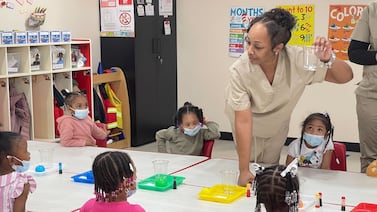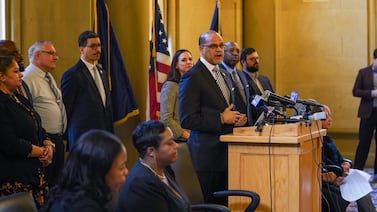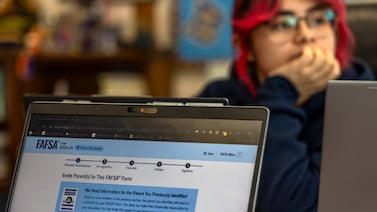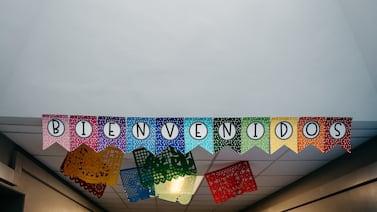Sign up for Chalkbeat Colorado’s free daily newsletter to get the latest reporting from us, plus curated news from other Colorado outlets, delivered to your inbox.
Emma Gonzalez Gutierrez has struggled to communicate with the teachers of her five children for years.
She’s tried to stay engaged. She’s attended meetings, gravitated toward Spanish-speaking staff, and relied on translators, including her kids, over the years.
Now, thanks to an app that McElwain Elementary, her Adams 12 school, started using this year, she’s found opportunities to engage in new ways with her youngest child’s education.
Recently, the kindergarten teacher texted her on the app, ReachWell, which allows the teacher to text in English and parents to receive the messages in their own language. The teacher told Gonzalez Gutierrez that her daughter had won a student of the month-type award and invited her to come to the school to surprise her daughter when the award was presented. The small gesture that meant so much to Gonzalez Gutierrez.
“For me it was very exciting,” Gonzalez Gutierrez said. “It was so valuable that she was able to let me know.”
ReachWell and similar translation apps have become more common, and for some teachers, they’ve become crucial as educators work to communicate with the rising number of families that don’t speak English. The apps often allow the communications between parents and teachers to feel personal. Some teachers say it has helped parents open up about issues their child or family is having, which then helps teachers better engage with students.
In addition to seeing text from teachers in their native language on ReachWell, parents can respond in their native language and teachers see the replies in English.
Kayli Brooks, a teacher at Tollgate Elementary in Aurora, uses the app Talking Points, which also allows her to text parents. It also translates texts between parents and educators but does not require families to download an app.
Become a Chalkbeat sponsor
“Families will share that they’re struggling with transportation, or here’s why maybe they’re acting out, or they might text me and say ‘hey this thing happened at home and I think my child is going to be really sad at school today,’” Brooks said. “It’s a huge deal. Families want to be involved in their child’s education no matter where they’re from, no matter what language they speak.”
Brooks said that since her Aurora school began using the app in 2020, she is much more successful at collecting permission forms, for example.
With migrant families who are new to the country and are “kind of overwhelmed,” she said, texting them through the app has also helped them better understand basic information they need to get their children started in school.
Communication that feels personal, through a text, is often more manageable for families than directing parents to online forms and resources, she said.
Sara Olson, principal of McElwain Elementary, said the ReachWell translation app is “a tool that provides equitable access.”
“It’s almost mind boggling to me that some of these folks have maneuvered schools for years not having access,” Olson said. “As a parent I can’t imagine not having access to the information, to the teachers. Every child and family member has a right to have that access.”
Olson said she did not have trouble having all families at her school download the app.
Zuben Bastani created the app ReachWell after he said he saw that some families at his child’s Denver school weren’t getting all the communications. He said he saw children excluded from field trips after arriving at school, unknowingly unprepared — wearing sneakers on the day of a snowshoeing trip, for example — because their families hadn’t understood the school communications.
“It became real apparent, real fast, which families were aware and showed up and which weren’t,” Bastani said.
The app is in use in many schools and districts in the metro area and across the country in places like Pittsburgh. In addition to schools, the company is also partnering with some emergency service agencies to provide emergency notifications — such as shelter-in-place or evacuation orders during natural disasters — that non-English speaking populations can receive in their home language.
Become a Chalkbeat sponsor
Jean Boylan, a community liaison at McMeen Elementary in Denver, also uses ReachWell at her school, but said she also has used Google’s translation app on her phone to greet parents face to face as they pick up students from school. She said staff are all looking for as many ways as possible to communicate.
In her school, concerns about whether new immigrant families have access to the internet, have led staff to start printing materials too. McMeen is one of a couple dozen Denver schools that have enrolled a significant number of new students from Venezuela and elsewhere this year.
But anytime they can communicate with the ReachWell app, it saves time and energy, Boylan said.
The app helps because there are so many languages spoken by families. She said there’s a map in her office with at least 27 countries highlighted, reflecting where the school’s current families come from.
Bastani said ReachWell has found that because parents have to download the app and self-select from more than 130 languages what their preferred language is, many schools find that they’ve been undercounting how many languages their families speak.
On average, they discover 25% more languages after a few months, ReachWell leaders said.
Boylan is now working with Bastani to build out a resource page that ReachWell offers in the app for families. It may include ways for families to access help such as for food or housing.
For parents like Gonzalez Gutierrez, the personal communications they have with teachers are the most critical.
Gonzalez Gutierrez said earlier this year, she realized her kindergartener had become frustrated with an online program the school used for kids to learn math. It was causing the child stress and fear and Gonzalez Gutierrez said she didn’t know how to talk to the teacher about it — until she realized that she could text her.
Letting the teacher know what the problem was allowed them to work together to solve it.
Become a Chalkbeat sponsor
“It’s worth it,” Gonzalez Gutierrez said. “It’s been such a gift for me.”
This story has been updated to reflect that users do not have to download the ReachWell app to get messages through ReachWell, though the downloading the app is an option.
Yesenia Robles is a reporter for Chalkbeat Colorado covering K-12 school districts and multilingual education. Contact Yesenia at yrobles@chalkbeat.org.






